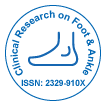Risk Factors Associated with lower extremity amputation in diabetic patients with neuropathic ulcerations of the foot treated with human recombinant Epidermal Growth factor (Heberprot P).
Abstract
Introduction: Early recognition and management of risk factors for amputations and the opportune solution of them may prevent this dramatic outcome, especially the major level of amputation. The present study was assumed to identify and quantify the risk factors for lower extremity amputation in diabetic patients with neuropathic ulcerations of the foot treated with Heberprot P.
Methods: Prospective study with 331 patients with diabetes and neuropathic ulcerations of the foot referred to the Matanzas Province Vascular Surgery Service of the Matanzas Province Clinic Surgical Hospital from January 2009 to May 2019 and followed through December 2021.
Results: The bad prognosis factors identified in this population were increase in the mean age of the amputated population 67.8 years old, smokers and high frequency of alcohol intake 63.2%. Rendering to the Diabetes Mellitus behaviour was finding a long-time of evolution of the disease 19.7 years; the presence of insulin treatment at the admission time in 63.2%; high prevalence of another diabetic’s complications like renal disease and ischemic heart disease in the 89.5%, also severe visual impairment in the 63.2%. According to the diabetic foot evaluation includes a Wagner 4 gradation patient 78.9%; the worse topography was associated with the middle segment 52.6%, and PEDIS gradation level 3 moderate infection in 89.5% (n=17). All the amputee had presence of osteomyelitis at the beginning of the treatment, the vascular status mark an ankle brachial index (ABI) lower than 0.6 63.2% and absent of both pedal pulses 78.9%, associated with a big Size more than 10 cm2 89.5% and time of evolution of the current ulcer of 14.9 weeks.
Conclusion: There are Risk factors Associated with lower extremity amputation in diabetic patients with neuropathic ulcerations of the foot treated with human recombinant Epidermal Growth factor.
Citation: Herrera ALG, Moliner ALG (2022) Risk Factors Associated with Lower Extremity Amputation in Diabetic Patients with Neuropathic Ulcerations of the Foot Treated with Human Recombinant Epidermal Growth Factor (Heberprot P). Clin Res Foot Ankle, 10: 352. Doi: 10.4172/2329-910X.1000352
Copyright: © 2022 Herrera ALG, et al. This is an open-access article distributed under the terms of the Creative Commons Attribution License, which permits unrestricted use, distribution, and reproduction in any medium, provided the original author and source are credited.
Share This Article
Recommended Journals
Open Access Journals
Article Tools
Article Usage
- Total views: 2434
- [From(publication date): 0-2022 - Apr 01, 2025]
- Breakdown by view type
- HTML page views: 2013
- PDF downloads: 421
